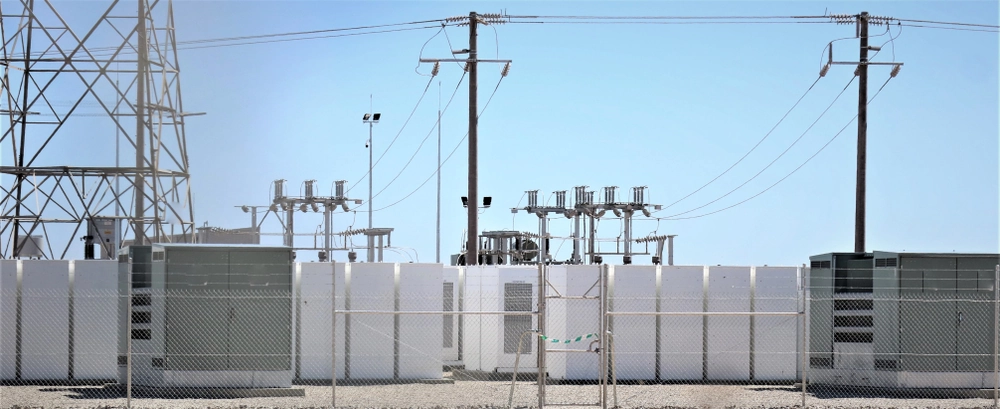
Risky business: contracting strategies for battery projects

By Mark Greatholder, Aliki Zeri
7 Jan 2025 | 5 minute read
Energy projects have been increasing in size and complexity and so has the manner in which works are procured and executed. In this article we are focussing on battery energy systems, looking at how developers are moving towards a multi-party contracting strategy and the risks that this may pose.
Traditional contracting
A traditional procurement model for energy projects involves a single contractor undertaking the work under a lump sum turnkey engineering procurement and construction (EPC) contract. Project funders, owners and project developers like this approach because it transfers the majority of the construction risk from the developer to a single contractor. However, this risk allocation comes at a price (as the contractor is being asked to take on the responsibility associated with works that are often carried out by third party subcontractors) and could have an impact on the construction programme as the contractor needs to factor in delays associated with the performance of third parties (for instance: for balance of plant and grid connection works subcontractors).
A move towards a split-contracting approach
In the past two to three years though, there has been a move away from this approach in respect of solar pv and wind projects. Solar pv projects in the UK, have, in their majority, minimal, well-defined construction risk. At the same time, such projects require a significant up-front capital investment to procure the solar panel modules, inverters and associated long-lead infrastructure items, which can affect the competitiveness of a bid from a single contractor. Owners and project developers have therefore been willing to procure solar pv modules and inverters directly and then 'free-issue' them to the EPC contractor to incorporate in their own design and use them as part of the project.
Wind projects have an even higher up-front capital investment and the requirement for specialist contractors to commission the wind turbines, as well as more extensive and complex civil construction and assembly work. This has led to further split-scope contracting with one contractor often covering the procurement of the wind turbine (and associated infrastructure) and another covering the civil construction, assembly and electrical works (although it is not unusual for a third contractor to be involved in the latter).
Battery Energy Storage System (BESS) projects come with their own complexities and also lend themselves to a split-contracting approach – such as the BESS and battery management system being included in one contract, the power conversion system and inverters in another, the civil construction and electrical installation in another, and the energy management system in another, although the most common procurement structure involves combining the first two elements – the BESS and the inverters – in one contract and keeping the rest separate.
Some contractors continue to offer a lump sum turnkey EPC that covers all the elements of a BESS project ("full-wrap EPC"), but the cost of such a procurement strategy may be more than a developer is willing to pay compared to a split-contracting approach. However, whilst a split-contracting approach may lower the cost, it exposes the project developer (and potentially the ultimate owner of the BESS) to a number of commercial and technical risks that must be managed during the project and its subsequent operation.
Key issues
Whilst split-contracting has advantages, particularly on the pricing front, there are certain key issues that need to be considered and agreed between the various contracting parties at the outset:
With multiple suppliers and contractors performing different scopes of work, a developer will need to ensure that the various contracts work together so that delays by one contractor do not impact the work of the other contractors. Where that is the case, it is anticipated that the affected contractor will have an entitlement to additional time and cost under their contract.
A contractor will be reluctant to agree to a fixed schedule or programme for the delivery of the whole of the works (or even certain milestones) as it is not responsible for the full scope of the works. However, rather than prescribing fixed delivery and performance requirements, delivery dates could be aligned by reference to a certain number of days/weeks after another milestone has been met. A milestone could be defined by reference to works that another contractor needs to complete or a specific step that the developer needs to take. For example, electrical installation must be completed and tested before the BESS supplier commences commissioning of the BESS. The BESS contractor commissioning deadline should then be X days after the notice of completion of cold commissioning.
Care must be taken to ensure that all scoping documents require the same division of responsibility with no scope gaps. Each contract should take into account the work being undertaken by other contractors and ensure that each contractor makes representations and warranties about its work scope and performance obligations.
The commissioning sequencing and process needs to be carefully thought through to ensure that the programme is managed and to mitigate the risk of any one contractor blaming another contractor for a failure of the BESS. It is common to include provisions requiring contractors to coordinate commissioning with other contractors and provide reasonable assistance to each other throughout the commissioning process. Contractors often seek to recover reasonable costs and be granted time relief for doing this, but we suggest that these obligations do not entitle any contractor to time or cost, as such cooperation should have already been factored in the contractor’s price.
A single point of responsibility in a full-wrap EPC provides a developer with a single responsible party for the recovery of delayed liquidated damages, provision of performance guarantees and any associated performance liquidated damages. That party will also be responsible for the rectification of any defects during the defects’ rectification period (and beyond).
Under a split-contracting approach, the developer will have separate claims under each individual contract. For instance, a key concern is performance of the energy management system which is a critical component of a BESS project giving the project the ability to effectively charge and discharge in accordance with applicable grid requirements. The unavailability of this system can be fatal to the project. However, the cost of this system as a proportion of the entire project is small. As such it is not commercially viable for the supplier of this system to provide a performance guarantee and be responsible for liquidated damages that are sized to the value of the overall project. In this instance, the project developer’s ability to recover for losses suffered is limited to the value of the specific contract, which will not adequately compensate the developer.
How can you mitigate the risk?
The right person for the right job
In most instances of split-contracting there will be a 'lead' party, which for a BESS project is likely to be the supplier (often also the manufacturer) of the battery, who will seek to introduce the developer to their contractor of choice (often someone they have worked with on other projects). In some cases, the battery supplier will have its own contracting arm, that can undertake the civil works and will be able to stand behind any manufacturer warranties.
Identifying the most appropriate contracting party for the project will be key to its success. Established relationships can offer the comfort that the project will meet the developer's requirements, but this does not mean that a developer should not complete a procurement exercise to identify the 'best' person for the proposed project. Recent years have seen several European companies enter the UK market, bringing experience gained in Spain, Italy and the US to bear and increasing competition amongst contractors in the UK.
Efficient procurement
With an abundance of choice and multiple contracting packages that need to be let, ensuring that the procurement process is run efficiently is paramount. Large procurement teams should be able to review tender responses fairly quickly, but this assumes that all bidders are raising the same or similar points or that the invitation to tender clearly identifies items that are not subject to negotiation (such that the focus is solely on the negotiable items). Where time is of the essence, technology can come to a procurement team's aid and provide a tailored solution to filtering tender responses such that the team can quickly whittle down the list of potential bidders.
Contract Management
As noted above, a split-contracting approach results in a multitude of interlinked contracts that need to work together. Managing these contracts such that a variation to the terms of one does not adversely affect the other(s) (for instance by relieving a contractor from its obligations) and that the project remains on track is the main challenge faced by project managers. To rise to this challenge, a project manager requires a clear understanding of the obligations imposed on each contractual party, how one contract relates to the other and the overall programme. Where project or construction financing is provided, this is even more important, as the funder will be closely scrutinising the project's overall progress as part of any financing arrangement. It is good practice, on conclusion of the negotiations, to produce a report outlining the key obligations under each agreement and an overall interface report for the project. However, a report will only go so far; it is the day-to-day management of the contractors (which may involve issuing appropriate notices under a contract or invoking available remedies) that will really make a difference to the project.
How we can help?
Our team has extensive experience advising on the issues identified above and the proposed solutions. If you would like to discuss a particular project, ways of making your procurement process more efficient or means of addressing issues that have arisen in connection with a current project, please do get in touch with our experts.













